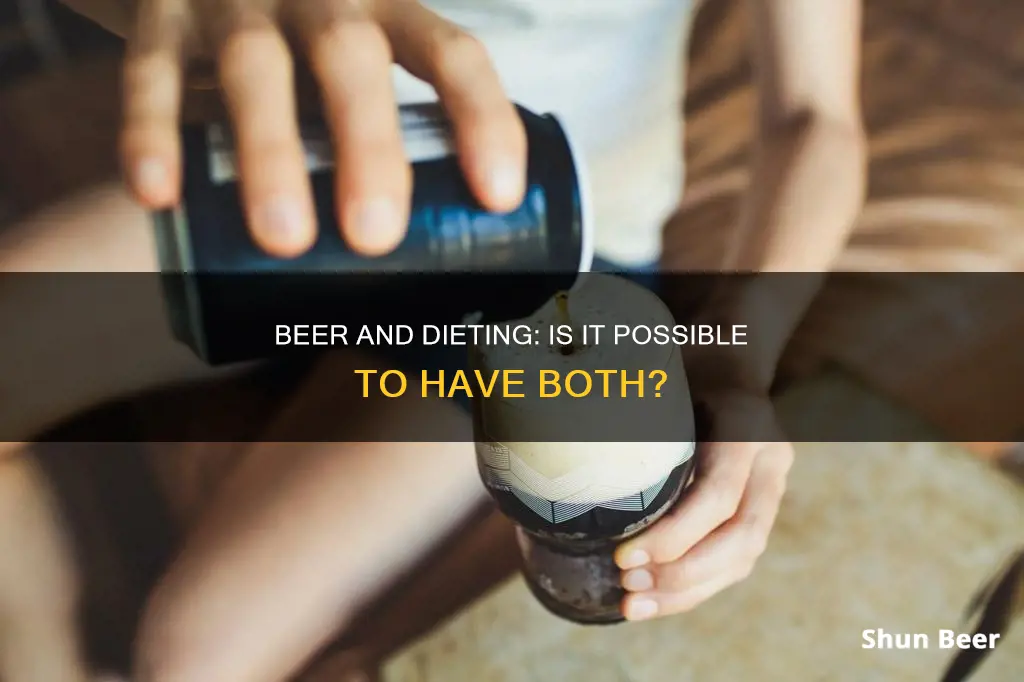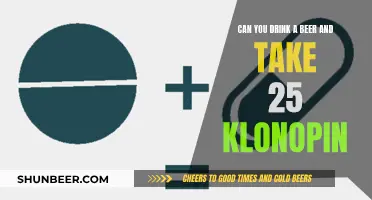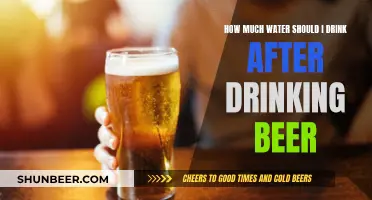
Beer and weight loss are not mutually exclusive, but it is challenging to lose weight while drinking beer. Beer is an empty calorie drink, providing almost no nutrients and making it easy to consume a lot of calories very quickly. A typical beer has 150 calories, and drinking several in one sitting can result in a serious calorie overload. Beer also negatively affects sleep quality and can inhibit self-control, leading to poor food choices and overeating. To lose weight, it is essential to consume fewer calories than you burn, and the high calorie count in beer can quickly add up, especially when paired with calorie-dense bar snacks. However, it is possible to enjoy the occasional beer while dieting by practising moderation and choosing low-calorie options.
What You'll Learn

Beer is high in calories, with a typical beer containing 150 calories
The high calorie content of beer is due to the alcohol it contains. Alcohol is high in calories, with seven calories per gram compared to four calories per gram for carbohydrates and protein. Beer is also made from cereal grains, such as barley, which contribute to the overall calorie count. The higher the alcohol content, the higher the number of calories in a beer.
If you're trying to lose weight, it's important to be mindful of how many calories you're consuming from beer. You can do this by checking the calorie information provided by some brewers on their websites or by using a calorie-tracking app. Another strategy is to adjust your food intake to compensate for the calories in beer. For example, if you have a daily calorie allowance of 2000 calories, drinking four beers that contain 100 calories each would mean reducing your food intake by 400 calories.
To reduce your calorie intake from beer, you can also choose light beers, which typically have around 90-100 calories. Drinking in moderation is also important, as consuming large quantities of alcohol can lead to a negative impact on your body's fat-burning ability. Moderation is typically defined as no more than one drink per day for women and no more than two drinks per day for men.
Beer Overload: Sore Throat Culprit?
You may want to see also

Alcohol slows down the burning of fat and increases appetite
Beer is a popular drink, and with the wide variety of options available, it's easy to include in your routine. However, if you're watching your weight, it's essential to understand how beer and alcohol, in general, can impact your diet and fitness goals.
Alcohol is calorie-dense, providing 7 kcal of energy per gram, which is more than that provided by carbohydrates or protein. This makes it a very attractive energy source for the body. As a result, when alcohol is present in the body, it is prioritised as a fuel source over glucose from carbohydrates or lipids from fats. This means that the excess glucose and lipids are stored as adipose tissue, or fat, which can lead to weight gain.
The high-calorie content of alcohol also interferes with the body's ability to burn fat. The body considers ethanol, the organic compound produced during fermentation, as a toxin. In response, the body will shut down all other metabolic pathways until all the ethanol is eliminated, which can take up to 36 hours. During this time, the body will not burn any fat.
In addition to slowing down fat burning, alcohol also increases appetite. Alcohol suppresses the oxidation of fatty acids, which contributes to feelings of hunger as fatty acids play a role in appetite regulation. It also increases thermogenesis, or calorie utilisation for heat production, which means you may feel hungry again faster than usual. Alcohol also stimulates or inhibits neurochemical systems that regulate appetite. It affects the hormones Leptin and GLP-1, which are responsible for suppressing appetite. As a result, you may start feeling hungry after a few drinks, even if you are actually full.
Alcohol also stimulates the same neurons in the brain that are triggered when the body goes into starvation mode, which can lead to ethanol-induced overeating. Additionally, alcohol reduces self-control, making it more likely that you will indulge in food cravings and make poor food choices.
So, while it may be challenging to completely cut out beer or alcohol when dieting, it's important to be mindful of its impact on your body. Reducing the amount you drink, choosing lower-calorie options, and drinking in moderation can help you stay on track with your fitness goals.
Drinking Beer With Theraflu: A Risky Combination
You may want to see also

Drinking in moderation is key
Drinking in moderation is a good way to enjoy a beer while still losing weight. According to the National Institute on Alcohol Abuse and Alcoholism (NIAAA), moderate drinking is defined as having up to four alcoholic drinks for men and three for women in a day, and a maximum of 14 drinks for men and seven drinks for women per week. However, it's important to note that drinking in excess can easily lead to a bloated belly and weight gain.
To drink beer in moderation while dieting, it's recommended to:
- Drink slowly and steadily. It takes the liver about an hour to process a standard drink, so drinking more than one beer in an hour will slow down the body's fat-burning ability and lead to more fat storage.
- Drink water before, during, and after consuming alcohol. This helps with hydration, as alcohol is a diuretic, and can also aid in moderating consumption and preventing a hangover.
- Be mindful of the shape of your beer glass. Straight-sided glasses are better for drinking in moderation than curved glasses, and glasses with marked volume measurements can help monitor intake.
- Eat protein before or while drinking. Protein is satiating and can help curb how many beers you drink in one sitting. It also decreases the absorption rate and increases the elimination rate of alcohol, reducing the amount of alcohol entering the bloodstream.
- Choose low-calorie beers. Light beers typically have fewer calories, but be aware that some drinkers may end up consuming more as it takes a higher quantity to get the same buzz.
- Drink less frequently. Alternating alcoholic drinks with non-alcoholic, low-calorie beverages, or drinking only on weekends, can help reduce overall calorie intake.
By following these tips, you can enjoy a beer while still staying on track with your diet and weight loss goals. However, it's important to remember that drinking in moderation is key, and you may need to adjust your food intake based on your calorie goals.
The Intricacies of a Beer Exchange: Trading and Sampling
You may want to see also

Choose light beers with 100 calories or less
Beer can be incorporated into a diet plan, but it is important to be aware of the number of calories in beer and how it can impact your weight-loss plan. Beer can contribute a lot of calories, which can be challenging for those trying to manage their weight.
Light beers are a great option if you're looking to cut down on calories without compromising on taste. Light beers typically have about 100 calories for a 12-ounce (355 mL) glass, compared to regular beers, which have about 150 calories. By choosing light beers with 100 calories or less, you can save more than 100 calories per drink, which can make a significant difference when you're trying to eat better or lose weight.
When selecting a light beer, look for beers with a lower alcohol by volume (ABV) percentage, as these will have fewer calories. Additionally, look for words like "low" or "light" in the name, as these are usually indicators of lower-calorie options.
- Hop 99 by Abita
- Lagunitas Daytime
- Oskar Blues One-y
- Goose Island So Lo
- Yuengling Light Lager
- Milwaukee's Best Light
- Molson Canadian 67
By choosing these lower-calorie options, you can still enjoy a cold beer while staying on track with your diet and weight loss goals.
Beer and Tylenol: Safe Mix or Not?
You may want to see also

Eat a healthy meal before drinking to avoid overeating
If you're dieting and want to drink beer, it's important to know that beer can contribute a lot of calories, making it challenging to manage your weight. The higher the ABV, the higher the calories. Therefore, drinking light or low % ABV beer is a good idea.
If you're drinking beer, it's a good idea to eat a healthy meal beforehand to avoid overeating. Drinking on an empty stomach will make you feel tipsy more quickly, which can lead to drinking more than you intended. Eating a meal that includes protein, fat, and carbohydrates is ideal, as this combination will fill you up and be absorbed more slowly.
- Eggs are highly nutritious and filling, packing 6 grams of protein per egg. They can help slow the emptying of your stomach and delay alcohol absorption.
- Oats are a great source of fiber and protein, which support feelings of fullness and ease the effects of alcohol.
- Bananas are high in potassium, which may prevent electrolyte imbalances associated with drinking alcohol. They are also made up of about 75% water, so they can help keep you hydrated.
- Salmon is a great source of omega-3 fatty acids and protein. Omega-3 fatty acids have been shown to reduce some of the harmful effects of alcohol, including inflammation in the brain caused by binge drinking.
- Greek yogurt is high in protein, which is digested slowly and can minimize the effects of alcohol on your body by slowing its absorption.
- Chia seeds are a great source of fiber and protein, as well as important micronutrients like manganese, magnesium, phosphorus, and calcium. Fiber can help delay the emptying of your stomach and slow the absorption of alcohol.
- Berries are loaded with essential nutrients, including fiber, manganese, and vitamins C and K. They are also rich in water, which helps to keep you hydrated and minimizes the effects of alcohol.
Drinking Beer on Amtrak: What's Allowed?
You may want to see also
Frequently asked questions
Yes, but it is harder to create a caloric deficit if you drink every day. Beer is an "empty calorie" as it provides almost no nutrients. It is also in liquid form, which means you can drink calories very fast. Beer contains alcohol, which is metabolized by the body differently than other macronutrients like protein, carbs and fat.
The best strategy is to limit the number of beers you have per week. The fewer beers you drink, the fewer empty calories you are ingesting. Maybe it's one beer a day, or better yet, 2 beers on Friday or Saturday.
Drink light or low % ABV beer. Lower ABV beers have fewer calories. A regular beer is about 150 calories for a 12-ounce (355 mL) glass, while a light beer is about 100 calories for the same serving size.







